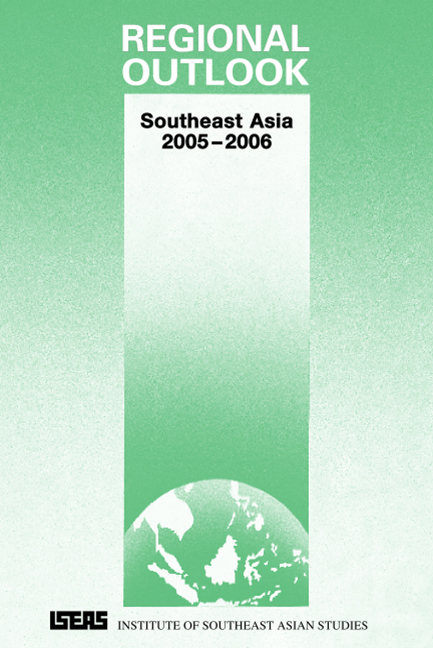Introduction
Published online by Cambridge University Press: 21 October 2015
Summary
Both Malaysia's Prime Minister Datuk Seri Abdullah Ahmad Badawi and the Philippines’ President Gloria Macapagal-Arroyo had their mandate renewed in national elections. Indonesia voted to have a new President, Susilo Bambang Yudhoyono. Singapore's Prime Minister Goh Chok Tong handed the leadership baton over to Lee Hsien Loong. Myanmar deposed its Prime Minister. Cambodia has a new king. Brunei has reconvened its State Legislative Council after 20 years. All these happened in 2004, which may give an impression that change is in the air.
However, the forecast for the region is not to expect anything radical from the new or renewed leadership. In some cases, the rhetoric is not matched by a more sober reality. In others, the need for reforms are dire but the new leader represents only a hope that things will improve somewhat rather than a definite solution to long-entrenched problems.
Indeed many problems remain very much unchanged in the region. Terrorism is still the region's foremost security threat. Indonesia had its third suicide bombing incident in September. A mix of regional separatism and violent forms of Islamic ideology continues to plague the Philippines’ south. A similar problem has escalated in the southern provinces of Thailand. Another pan-region health threat in the form of the avian flu serves as reminder that the disruptive effects of the Severe Acute Respiratory Syndrome (SARS) in 2003 can be repeated any time. As always, here and there are pockets of optimism scattered among the patches of resignation. The conduct of peaceful elections in the Philippines, Malaysia, and Indonesia augurs well for the region's short-to-medium-term growth prospects. One resilient bright spot is that countries in the region are not at each other's throat even as they grapple with serious domestic problems, thus giving the region an overall environment of peace and harmony. There remains a unity of purpose and will to fight Islamic terrorist groups.
- Type
- Chapter
- Information
- Regional OutlookSoutheast Asia 2005-2006, pp. ix - xiPublisher: ISEAS–Yusof Ishak InstitutePrint publication year: 2004



